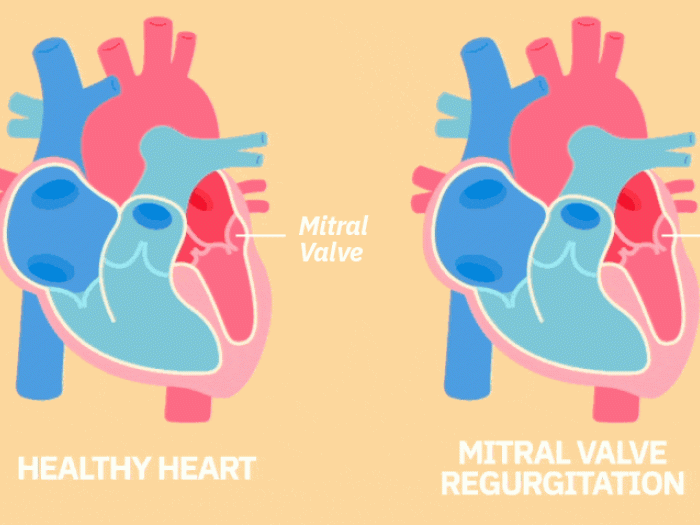Mitral valve disease can prompt discussion about treatment and surgery. A Michigan Medicine specialist explains symptoms and care options.
7:00 AM
Author |

Your heart's mitral valve plays an important role. It regulates the flow of blood between the left atrium (the upper heart chamber) and the left ventricle (the lower heart chamber).
MORE FROM MICHIGAN: Sign up for our weekly newsletter
But if the mitral valve doesn't close properly, or open completely, your heart may have to work twice as hard to do its job. That can lead to a host of problems, including atrial fibrillation, embolism, blood clots, stroke or congestive heart failure.
That's why preventive action can be lifesaving.
Michigan Medicine cardiac surgeon Matthew Romano, M.D., spoke about the different types of mitral valve disease — as well as symptoms, diagnosis and treatment.
What is mitral valve stenosis?
Romano: Mitral valve stenosis is a condition in which the mitral valve does not open completely because the flaps or leaflets of the valve have thickened, stiffened or fused together. The result is a narrowing of the valve that prevents it from fully opening, restricting blood flow through the valve.
What is mitral valve regurgitation?
Romano: Mitral valve regurgitation is a condition in which a leak causes a backward flow of blood from the heart and into the lungs. This can be caused by mitral valve prolapse, a condition in which the leaflets do not close properly, allowing blood to leak backward.
How would I know if I had a leaking mitral valve?
Romano: Although some individuals may not have any symptoms early in the progression, others may experience a cough, shortness of breath, low energy level, pain or tightness in the chest, an irregular or fast heartbeat and swelling in the ankles, feet or legs.
How is a leaky mitral valve diagnosed?
Romano: Oftentimes, a leaky mitral valve is discovered during a routine physical exam when a heart murmur is heard via a stethoscope. This murmur is the result of turbulent blood flow through the valve. Further tests to confirm the diagnosis include an echocardiogram, transesophageal echocardiogram, X-ray and cardiac catherization.
Can a leaky mitral valve be treated with medication?
Romano: Yes, medications such as diuretics, beta-blockers and blood thinners are often used to treat heart valve disease. Medication doesn't prevent the progression of mitral valve disease, but can help ease the symptoms.
When is surgery considered?
Romano: Indications of the need for mitral valve repair include a murmur that has become louder or regurgitation that worsens. Your cardiologist can help determine when the time is right to consider surgery.
Can a leaky valve always be repaired or is it sometimes necessary to replace the valve?
Romano: Repair is the treatment of choice for patients with a leaky mitral valve. Repair offers lower operative and long-term mortality than valve replacement, as well as better preservation of left ventricular function and reduced risk of endocarditis (an infection of the heart's valves or inner lining).
SEE ALSO: Mitral Valve Repair vs. Replacement: Why Early Intervention Matters
Mitral valve replacement may be recommended if the valve is ballooning extensively, there is severe stenosis of the valve or endocarditis has caused damage.
How invasive is the surgery?
Romano: Some patients may be able to undergo minimally invasive surgery for mitral valve repair. A variety of innovative techniques and devices can be used to repair or replace the mitral valve without open-heart surgery, typically resulting in a shorter hospital stay, faster recovery and less pain.
For example, transcatheter valve technology is a less invasive means of treating valve disease and is designed to allow physicians to deliver repair devices or replacement valves via a catheter through the body's cardiovascular system, thus eliminating the need for open-heart surgery.
There are several percutaneous (performed through the skin) devices currently being used to treat mitral regurgitation. In addition, new percutaneous options are being studied, with many currently in clinical trial. Your surgeon will discuss all options with you to ensure the best outcome.
Is my valve repair good for a lifetime?
Romano: In most cases, mitral valve repair will put patients back on their natural life survival rate, as if they had never experienced a heart issue.
How long do bioprosthetic replacement valves typically last?
Romano: Since the life span of a bioprosthetic valve is approximately 10 to 15 years, patients should be monitored closely by their cardiologist for symptoms and have regular echocardiograms to determine when the valve should be replaced.
Do I have to undergo open-heart surgery to have my bioprosthetic mitral valve replaced?
Romano: Not necessarily. Transcatheter technology is being used to restore the function of failing bioprosthetic mitral valves. Known as the "valve-in-valve" technique, the procedure involves inserting a valve inside of a failing bioprosthetic valve via a catheter through an artery in the groin. This technique may offer the best valve replacement option for high-risk surgical patients.
What factors should I consider when deciding where to have my valve repaired?
Romano: Patients should consider the surgeon and the surgical team's experience in performing mitral valve repair or replacement procedures. High volume translates to extensive experience in the operating room and better outcomes for patients.

Explore a variety of health care news & stories by visiting the Health Lab home page for more articles.

Department of Communication at Michigan Medicine
Want top health & research news weekly? Sign up for Health Lab’s newsletters today!





